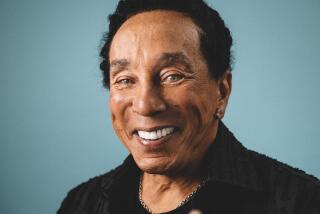MOVIE REVIEW : ‘Candy Mountain’ Offers Vistas of the Downside of Rock ‘n’ Roll
- Share via
“Candy Mountain” (selected theaters) is a comedy with blood and tears on its mouth; a romance with a knife in its heart. It’s also an action movie about running nowhere, and a musical about the music no one hears. Writer-director Rudy Wurlitzer and co-director Robert Frank take these paradoxes and play with them gently, soberly, turning them into fierce poetry.
It’s an ‘80s “road” film--in the ‘70s vein of “Five Easy Pieces” or “Two Lane Blacktop” (which Wurlitzer wrote)--and it’s almost a little masterpiece: morally brave, beautifully measured, funny, sad and powerful. With quiet skill, it tears open and subverts some glittery fantasies of the American dream.
The film deals with the kind of rock ‘n’ roll ride to glory exploited in one vacuous ‘80s success saga after another: the “candy mountain” of a young Manhattan musician named Julius (Kevin J. O’Connor). Julius tries to seize his day by hiring himself out to sleazy rock star Keith Burns (David Johansen) to track down the lost genius with whom Burns is obsessed: Elmore Silk (Harris Yulin), Stradivarius of the acoustic rock guitar, who vanished up north.
But Frank and Wurlitzer undercut Julius from his first scenes, showing him as impetuous, disorganized, passive, a physical coward, a lousy musician, a bad liar and a hopelessly inept adventurer.
What holds us with Julius through his appalling odyssey is the refreshing honesty of Kevin J. O’Connor’s performance, and the wild, understated, Bunuelian humor. There’s something else: Pathetic as Julius proves to be, he shows moral growth. There are two constants in the curiously frozen world Julius passes through: booze and music. Everybody drinks and everybody, after a fashion, sings. Frank and Wurlitzer cast many well-known musicians as the oddballs and eccentrics that Julius meets along the way: there is Tom Waits’ drunken piano plunking, Leon Redbone’s muttered ballads, Rita McNeil’s sweet songs in an empty bar. Their presence suggests a worldly harmony that mocks the get-rich-quick fantasies of the musical mediocrity Julius and the avarice of Burns and his agents.
Burns and his men are obsessed with the uncompromising Silk precisely because they are so compromised themselves. They would like to tame him to validate their empty cynicism.
But when we finally meet Silk--in a great, furiously controlled performance by Harris Yulin, shambling around like a wounded, sodden, bemused bear--we can see what drove him North, why he won’t cut their kind of deal. Silk is a different kind of idealist, the kind Julius--who would love to have enough talent to prostitute himself--can’t understand. Silk is a failed romantic, which may make him an even greater cynic than Burns.
“Candy Mountain” (Times-rated: Mature, for language and brief nudity) has rigorous poetic logic and a crazy, free-wheeling spontaneity. In its rhythm-haunted, booze-drenched, self-destructing world, there are vagrant scraps of beauty: romantic dreams, moments of kindness and love, the rapture of a landscape.
Robert Frank has the great photographer’s ability to illuminate the ordinary and many of the shots that he and cinematographer Pia Corradi get in “Candy Mountain”--one roadside where the cars spurt past in multicolored explosions, or the freezing hills and gray ocean-side vistas--have a ravishing beauty that sneaks up on you.
Those images are matched by the poignancy and enigmatic wit of Wurlitzer’s dialogue. Together they create an anti-success saga which says more about dreams, heroism and breakthrough than most of the rich, prepackaged movie fantasies around it: all those modern candy mountains that crumble.
More to Read
Only good movies
Get the Indie Focus newsletter, Mark Olsen's weekly guide to the world of cinema.
You may occasionally receive promotional content from the Los Angeles Times.









